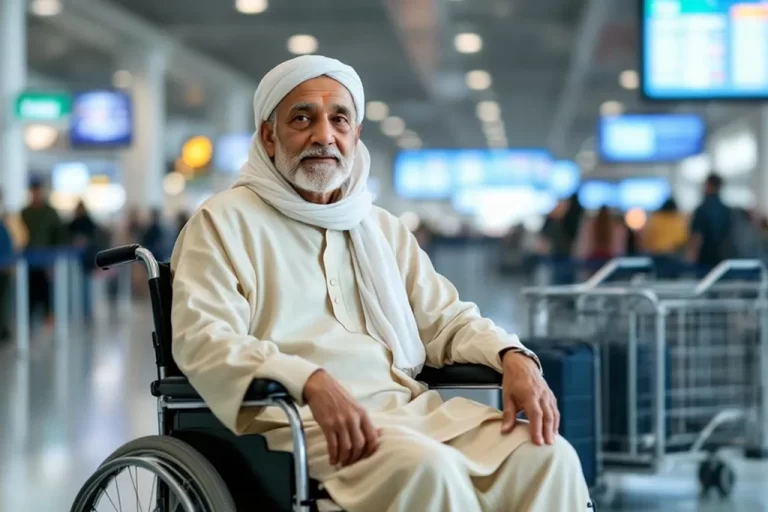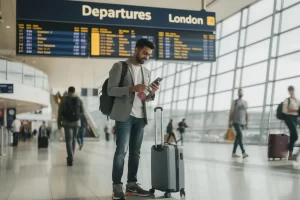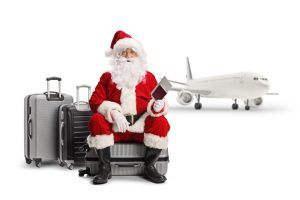Traveling can be wonderful, but passengers with disabilities, reduced mobility (PRM), or hidden disabilities face unique challenges. Whether you use a wheelchair, have a hidden disability, or need extra support, knowing how to request wheelchair assistance UK to India flights and other special assistance can make your journey smoother. Airlines offer various assistance, including help with mobility aids, assistance dogs, and seating arrangements. Passengers can often reserve seats free if they have specific needs. This guide covers the types of assistance available, how to request it in advance, and what to expect at the airport and onboard, ensuring a comfortable trip while promoting sustainable travel UK to India.
Inshorts:
Request wheelchair assistance or other PRM assistance on India routes at least 48 hours before your flight by making an airlines special assistance request.
Multiple types of wheelchair help are available (ramp, step, full cabin).
Sunflower Lanyard can be used for hidden disability airport support travel.
Airports and airlines offer help free of charge.
Special documentation may be needed; keep all papers handy.
Notify airlines early for seamless support.
Consider the shoulder seasons for UK travellers to India to avoid peak crowds and enjoy a more comfortable travel experience.
Check requirements for India tourist visa guide for UK citizens well in advance to ensure smooth travel planning.
Why Request Assistance?
Passengers travelling with disabilities, reduced mobility, or hidden disabilities may find travelling overwhelming, but airlines and airports are prepared to help make your journey smoother and worry-free. Indian families, elderly travellers, students, and professionals can benefit from pre-booked wheelchair assistance UK to India flights and other disabled travel support, including the option to travel with a travel companion for safety and additional assistance. Traveling with a companion can be especially helpful during boarding the aircraft, as they can assist with procedures and provide support in emergency situations. Passengers should inform their airline in advance about their mobility aids and assistance needs, as free wheelchair usage is available to all passengers, ensuring mobility support from arrival at the airport through to boarding.
Types of Special Assistance Available
Wheelchair Options: Choose from ramp-only (WCHR), steps-required (WCHS), or full-cabin (WCHC) wheelchairs depending on your mobility level.
Hidden Disabilities Travel: If you have conditions like autism, anxiety, or dementia, wear a Sunflower Lanyard at UK airports for hidden disability airport support. Staff are trained to assist in a discreet, respectful way.
Hearing/Visual Support: Assistance for blind or deaf travellers, including help navigating the airport and during boarding. British Sign Language (BSL) interpretation is available for deaf passengers, including during safety briefings and onboard announcements.
Mobility Support at UK Airports: Dedicated mobility support at UK airports is available to ensure passengers with reduced mobility or disabilities receive personalized assistance, including help with boarding gate navigation and airport wheelchair services. Support is also available for travelers using an electric mobility aid and other types of mobility devices, with staff trained in the proper handling and care required for wheelchair mobility and all mobility devices during air travel.
Onboard Wheelchairs: Onboard wheelchairs are available on every aircraft to assist with in-flight mobility. Tailored safety briefings are provided to passengers with special needs, ensuring they are familiar with emergency procedures and onboard safety equipment.
Powered Wheelchairs: Powered wheelchairs use a motor for easier propulsion and are suitable for those who need a wheelchair most of the time. When traveling with a powered wheelchair or mobility aid, check airline policies regarding lithium ion batteries, spare batteries, and ensure all batteries are securely attached to the device as required by safety regulations.
When and How to Request Support
Request Early: Always inform the airline or booking agent about your needs—ideally while booking, or at least 48 hours before scheduled departure time by submitting an airlines special assistance request.
How to Book: Use the airline’s website, helplines, or your travel agent to list your request (for example: “wheelchair assistance UK to India flights needed at both airports”). Booking assistance and managing assistance requirements is often more convenient when booking online, as you can specify your needs directly during the reservation process. Log into your account before travel to update any requested assistance, especially if your needs change after booking.
Medical Cases: For passengers with a medical condition, inform the airline in advance and provide any required documentation or certificates to ensure safe and compliant travel. For serious health conditions, you may need your doctor to fill a travel fitness (MEDIF) form. Some passengers may require medical clearance before travel, especially after recent surgery, injury, or with chronic illnesses. Airlines may require documentation if you require medical clearance. Chronic conditions might be approved by a Frequent Traveller’s Medical Card (FREMEC) for simplicity.
Assistance Dogs: Assistance dogs must meet specific training and certification standards, have up-to-date vaccination records, and require advance notification to the airline—at least 48 hours in advance—to ensure smooth passage through airports and on flights.
Oxygen Equipment: A medical certificate is required if you are bringing oxygen cylinders or concentrators for medical reasons. Passengers can take two small compressed air or oxygen cylinders for personal medical use on board, but they must not exceed certain dimensions and weight. If you are bringing other medical equipment, notify the airline in advance and add any requested additional assistance during the flight booking process.
At the Airport
UK Airports: The Sunflower Lanyard scheme helps staff discreetly identify and support those with hidden disabilities. Dedicated mobility support ensures smooth assistance with airport wheelchairs and boarding gate help, from drop-off points to the departure lounge and departure gate. Personalized support is also available at the arrival airport to assist passengers through arrival procedures.
India Airports: Similar PRM assistance on India routes and airport assistance are available. Always approach the airline service counter if you need urgent help.
Boarding & Disembarking: Passengers needing wheelchair or PRM assistance on UK to India flights usually board first and disembark last for comfort. Staff assist passengers as they board the aircraft, including arrangements for priority boarding. Assistance is provided up to the aircraft door, with manual wheelchairs stored in the aircraft hold. Cabin crew support mobility needs onboard and offer tailored safety briefings covering emergency equipment and exit procedures. Passengers requiring special assistance cannot be seated in emergency exit rows due to safety regulations.
Security Searches: Passengers requiring wheelchair or mobility assistance may receive special consideration during security searches to minimize waiting times and physical strain.
Free Assistance: Assistance services are offered free of charge to disabled passengers under EC Regulation 1107/2006, and wheelchair or mobility devices are generally carried free on both departure and destination airports.
Oxygen Restrictions: Liquid oxygen is not permitted on board aircraft in the aircraft cabin or the hold.
What Mobility Aid to Carry
ID and UDID cards or medical documentation
Confirmation of special assistance from the airline
Doctor’s letter or medical forms (if needed)
Provide details about your mobility equipment, including manufacturer information, battery type (such as lithium ion batteries), and any spare batteries you may be carrying
Any equipment details (like battery info for powered wheelchairs)
Have your contact details available for the airline or airport staff
Passengers should carry their notification card or Unique ID for persons with disabilities (UDID) or other medical documentation.
Friendly Travel Tips
Keep Extras: Always carry extra medicine, a charger, and snacks.
Travel Light: Pack only what you need in your cabin luggage for easy access, considering the baggage allowance rules.
Be Patient: Sometimes support staff are managing several travellers—waiting a bit can help.
Medication Storage: Passengers can bring gel packs or cooler bags to maintain the temperature of their medication on board.
Travel Companion: If you require additional assistance with administering medication or mobility support, consider travelling with a trusted travel companion who can provide a support system throughout your journey.
FAQs
Is there a cost for special assistance?
No, assistance, including wheelchair assistance UK to India flights and support for hidden disabilities travel, is free when travelling from UK airports and on most airlines.
Who can I contact if I need help at the airport?
Look for the assistance desk, contact the assisted travel team, or approach airline staff directly. They are trained to help and can provide extra assistance if you show relevant documents.
What is the airline’s policy on assistance dogs and service dogs?
Trained assistance and service dogs may travel if all documentation and training requirements are met. Airlines accept liability only under these conditions. Advance notification and proper certification are required, and booking arrangements must be made to ensure appropriate accommodations.
Who can travel and are there any restrictions?
Most passengers, including those with disabilities or medical conditions, can travel with proper support. However, airlines may refuse carriage if a passenger’s condition risks safety or flight operations. Under regulation EC 1107/06, airlines and agents cannot refuse bookings





